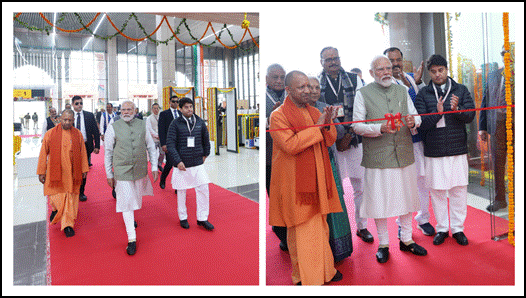Authors: Pragya Paliwal/ Himanshu Pathak/ Saurabh Kalia
In the heart of Ayodhya, where history seamlessly intertwines with spirituality, a monumental transformation is underway, one that extends far beyond the sacred grounds of the Ram Mandir. As the majestic temple takes shape, the Government of India, in a visionary stride, had orchestrated a comprehensive overhaul of Ayodhya’s connectivity, propelling the ancient city into a new era of accessibility.
At the forefront of this evolution stands the newly inaugurated and redeveloped railway station of Ayodhya, now renamed as Ayodhya Dham railway station. Developed at a cost exceeding Rs 240 crore, it symbolizes the government’s commitment to modernising connectivity. The three-story marvel boasts lifts, escalators, food plazas, and shops catering to puja needs, blending spirituality with modern convenience. Beyond functionality, it prioritizes inclusivity with facilities like cloakrooms, child care rooms, and waiting halls, proudly holding ‘accessible for all’ and ‘IGBC certified green station building’ labels. The significance of this transformation was underscored when the Prime Minister himself graced Ayodhya with his presence, flagging off a groundbreaking development—the Amrit Bharat Express, a new category of superfast passenger trains in the country. In addition, during the event, the Prime Minister also inaugurated the Ayodhya-Anand Vihar Terminal Vande Bharat Express.

Ayodhya’s transformation extends beyond railways with the inauguration of the Maharishi Valmiki International Airport in December 2023. Developed at a cost exceeding Rs 1450 crore, Phase 1 introduces a state-of-the-art terminal spanning 6500 sqm, set to serve 10 lakh passengers annually. The terminal, reflecting the upcoming Shri Ram Mandir, features temple-inspired architecture on its facade, while its interiors showcase local art and murals reflecting city’s cultural heritage. In the second phase, the airport aims to cater to 60 lakh commuters annually, fostering improved connectivity that is poised to stimulate tourism, boost business activities, and generate employment opportunities in the region.
Ayodhya’s transformation is not limited to just transportation infrastructure and extends to overall development of Ayodhya. A recent visit by the Prime Minister saw the inauguration of four newly redeveloped, widened, and beautified roads – Rampath, Bhaktipath, Dharampath, and Shri Ram Janmabhoomi Path – enhancing accessibility for pilgrims and tourists.
The redevelopment of Ayodhya’s infrastructure and the investment in tourism sector demonstrate a holistic approach to the city’s transformation. By improving connectivity, enhancing the visitor experience, and preserving its cultural heritage, Ayodhya is poised to become a thriving center of pilgrimage, tourism, and economic prosperity.
(Source: PIB)